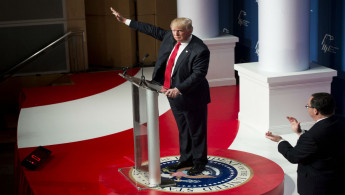Trump's xenophobia is a symptom of America's toxic politics
Donald Trump, the leading Republican presidential candidate was subject to international condemnation after he called for a "total and complete" shutdown of Muslims entering the US on Monday.
Trump's outlandish proposal, which he labeled as "common sense", was the latest and most inflammatory statement made by the presidential hopeful since he decided to position himself as the far-right candidate.
Trump even received criticism from the leaders of his own party, as the Republican House Speaker Paul Ryan said on Tuesday: "This is not conservatism. What was proposed yesterday is not what this party stands for."
Even former vice president Dick Cheney who previously said that he would back the Republican presidential nominee even if it was Trump, said Trump's proposal "goes against everything we stand for and believe in."
| Despite the strong statements, Donald Trump remains a presidential candidate for the party, and one who is leading in the polls for that matter. |
The strongest Republican response to Donald Trump came from fellow presidential candidate, Senator Lindsey Graham who called Trump a "race-baiting, xenophobic religious bigot" in an interview with CNN.
Graham said that Trump does not represent the Republican Party and his statements have won him the title of Islamic State group's (IS) "man of the year" because his rhetoric was "empowering the enemy".
Jeffery Goldberg, an Israeli-American journalist who is viewed as one of the leading pro-Iraq war propagandists, shared Graham's sentiments and called Trump "an actual threat to national security".
Twitter Post
|
However, despite the strong statements, Donald Trump remains a presidential candidate for the party, and one who is leading in the polls for that matter.
Therefore, calling Trump "unhinged" or any other description does not take away from that fact that he is supported by a large segment of conservative voters, who have kept him ahead in the polls for months.
Toxic discourse
Donald Trump is not a marginal figure in the US presidential race, but has become the Republican Party's frontrunner despite, or perhaps because of his repeated incendiary remarks, which so many in the Republican base view as representing them and their values.
He is a symptom of the toxic political discourse that has gripped the United States in recent years and has been made worse by the rise of IS in Syria and Iraq and the siege mentality rhetoric so often used by American politicians.
In the past few months alone, far right American groups have organised armed protests in front of American mosques and declared areas "Moslem free zones" while their political leaders warned of the threats posed by refugees and other "outsiders".
Fear mongering and hate speech have not been the preserve of Donald Trump alone, as presidential candidate Ben Carson has also dabbled in the subject by saying that no Muslim should become the president of the United States.
| The result of such discourse has been a sharp increase in Islamophobic attacks against Muslims in the US. |
Last week, speaking in the wake of the San Bernardino shooting, Jerry Falwell Jr., the president of Liberty University, a Christian school heavily courted by presidential candidates encouraged his students to carry concealed firearms to end the "Muslims".
"I've always thought that if more good people had concealed-carry permits, then we could end those Muslims before they walked in," said Falwell Jr. to an applauding crowd of students.
The result of such discourse has been a sharp increase in Islamophobic attacks against Muslims in the US.
A Pakistani taxi driver was shot in the city of Pittsburgh, Pennsylvania on 26 November by a passenger who talked about IS and mocked the driver's faith.
A day after the San Bernardino attack, a Mosque in Palm Beach Florida was broken into and vandalized, and the Council on American-Islamic Relations (CAIR), a Muslim advocacy group, says reports of Islamophobic attacks have dramatically increased since the Paris attacks.
"We haven't seen this toxic, anti-Muslim atmosphere since 9/11. And in some ways, it might even even be worse in the terms of the mainstreaming of anti-Muslim hate in our society," Ibrahim Hooper, CAIR's National Media Director told the International Business Times.
In a country where divisive politics is the norm, immigrants, refugee and Muslim baiting have become the order of the day it seems.
Meanwhile, the politicians are dumbfounded as to how the discourse reached this dangerous level, only weeks after they passed legislation to bar Syrian and Iraqi refugees from entering the country unless security services could guarantee they do not pose a "terrorist" risk.



